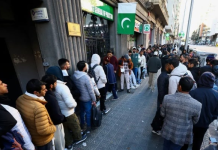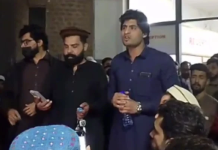ISLAMABAD, JAN 10: The Supreme Court’s constitutional bench, headed by Justice Aminuddin, continued hearing intra-court appeals challenging the nullification of civilian trials in military courts. Defence Ministry lawyer Khawaja Haris was unable to complete his arguments, and the hearing was adjourned until Monday.
During the proceedings, the court revisited the October 12, 1999, plane conspiracy case involving former president Gen (retd) Pervez Musharraf, with Justice Musarat Hilali noting that the incident led to the imposition of martial law, yet the trial was not held in a military court. Khawaja Haris clarified that hijacking is not listed under the Army Act, making such a trial impossible.
She said an army chief’s plane was told to leave the country by turning off the lights at the airport. The lives of all the passengers aboard were put in danger, she added.
“How could a person who was not on the plane hijack it?” Khawaja Haris asked. Justice Hilali asked where a trial will be held if a military or fighter plane is hijacked.
Khawaja Haris argued that the Army Act is a special law and the evidence and trial procedure of special laws are different.
Justice Jamal Mandokhel remarked that with a parliamentary majority, crimes like hijacking or murder (Section 302) could be included in the Army Act. He emphasized that the procedure of military court trials requires scrutiny, questioning whether army officers conducting the trials possess adequate experience to pronounce verdicts, especially death sentences.
Also Read: Supreme Court seeks clarity on military trial of May 9 rioters
Justice Hilali questioned how an officer who had not conducted the trial could decide on sentencing, saying the officer who conducts a trial does not pronounce the verdict himself. “The officer conducting the trial sends the case to another senior officer, who delivers the verdict,” she added. She highlighted discrepancies in how verdicts are written, and asked for clarification about the military court process.
Haris remarked that the military’s judge advocate general branch assisted in writing the verdict.
Justice Naeem Akhtar Afghan remarked that there is a general impression that the trial in a military court is only to the extent of punishment. He added that the suspects receive the facility to hire a lawyer of their choice in a court martial.
“A lawyer is also appointed for the suspects along with an officer as a friend,” said Justice Hassan Azhar Rizvi, adding that the only difference is that the judges in military courts are officers.
Justice Mandokhel remarked that the Army Act is applicable only to the army, and said it would be seen if military officers get fundamental rights and justice or not.
Justice Afghan remarked that everyone understood military courts did not conduct trials like civilian courts. Justice Mandokhel said as per the Constitution, these courts provided protection to all fundamental rights.
Justice Hilali asked who the judge is if such a trial takes place in any other country. Justice Muhammad Ali Mazhar remarked that all over the world, only officers sit in courts martial. Khawaja Haris told the court that officers sitting in courts martial possessed experience of such trials.
Justice Mandokhel further said that appeals against the decision of military courts could only determine malice and jurisdiction, while merits could not be discussed in an appeal.
Also Read: Supreme Court Cancels Hearings on Civilian Trials in Military Courts
“Decisions of military courts cannot be challenged even on the basis of fundamental rights,” Khawaja Haris told the court.
Justice Mandokhel remarked that, keeping this in mind, the scope of the Army Act should be limited instead of expanding its application. Those against whom a decision is pronounced in the army should also have the right to appeal in civilian courts, he added.
Justice Hilali commented that in all the FIRs in the May 9 cases, all the provisions of the Anti-Terrorism Act were included, asking how a military trial was conducted on these provisions. “How can a military court handle cases registered under the Pakistan Penal Code and ATA?” she asked.
“The Army Act applies only to those who have violated the Official Secrets Act, and does not apply to every terrorist,” Khawaja Haris argued, adding that when a suspect is handed over into military custody, it has its own system of investigation.
Additional Attorney General Aamir Rehman told the court that there are 35 FIRs and 5,000 suspects in the May 9, 2023, cases, adding that only 105 of them, whose presence was proven, were tried in military courts.
Khawaja Haris remarked that past cases like Kulbhushan Jadhav’s were also tried in a military court, while the trial was also recognised by the International Court of Justice. The lawyer also mentioned that appeals against military court sentences have been entertained by high courts in terrorist cases.

















